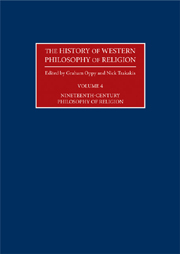Book contents
- Frontmatter
- Contents
- Editorial Introduction
- Contributors
- 1 Nineteenth-Century Philosophy of Religion: An Introduction
- 2 Johann Gottlieb Fichte
- 3 Friedrich Schleiermacher
- 4 G. W. F. Hegel
- 5 Friedrich Schelling
- 6 Arthur Schopenhauer
- 7 Auguste Comte
- 8 John Henry Newman
- 9 Ralph Waldo Emerson
- 10 Ludwig Feuerbach
- 11 John Stuart Mill
- 12 Charles Darwin
- 13 Søren Kierkegaard
- 14 Karl Marx and Friedrich Engels
- 15 Wilhelm Dilthey
- 16 Edward Caird
- 17 Charles S. Peirce
- 18 Friedrich Nietzsche
- 19 Josiah Royce
- 20 Sigmund Freud
- 21 Émile Durkheim
- Chronology
- Bibliography
- Index
9 - Ralph Waldo Emerson
- Frontmatter
- Contents
- Editorial Introduction
- Contributors
- 1 Nineteenth-Century Philosophy of Religion: An Introduction
- 2 Johann Gottlieb Fichte
- 3 Friedrich Schleiermacher
- 4 G. W. F. Hegel
- 5 Friedrich Schelling
- 6 Arthur Schopenhauer
- 7 Auguste Comte
- 8 John Henry Newman
- 9 Ralph Waldo Emerson
- 10 Ludwig Feuerbach
- 11 John Stuart Mill
- 12 Charles Darwin
- 13 Søren Kierkegaard
- 14 Karl Marx and Friedrich Engels
- 15 Wilhelm Dilthey
- 16 Edward Caird
- 17 Charles S. Peirce
- 18 Friedrich Nietzsche
- 19 Josiah Royce
- 20 Sigmund Freud
- 21 Émile Durkheim
- Chronology
- Bibliography
- Index
Summary
Ralph Waldo Emerson's (1803–82) philosophy of religion has roots in the Unitarian culture in which he was raised and his own mystical experiences, but it also draws from his reading in a vast array of philosophical, literary and religious texts. Emerson saw a ‘wide world’ (the title of his first journal) of religious thought and experience, and he sought both to distil that thought in his writings and to encourage in his audience what he calls ‘the one thing in the world, of value’: ‘the active soul’. That ‘soul’, whether in the form of the ‘intuition’ cited in his “Divinity School Address”, the ‘eternal One’ depicted in “The Over-Soul” or the Hindu conception of a supreme soul present in all creatures, lies at the centre of Emerson's philosophy of religion.
According to Emerson, the human experience of the divine is available to all people, but it is memorably and influentially expressed only in the lives and teachings of a few. The experience is ineffable, however, and all language about it is just a set of hints or thin remembrances of the original ‘intuition’. The words and lives of Moses, Jesus, Plotinus and George Fox inspire religious traditions, but these traditions characteristically tend to focus, Emerson argues, on the personal, accidental features of their lives, while forgetting the ‘impersonal’ and universal truths to which they called attention.
- Type
- Chapter
- Information
- The History of Western Philosophy of Religion , pp. 119 - 132Publisher: Acumen PublishingPrint publication year: 2009
- 1
- Cited by



